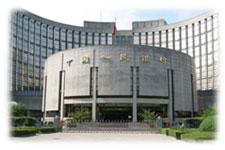Volatility in stock market expected
By Jin Jing (China Daily)Updated: 2007-05-21 08:48
The central bank's renewed efforts to curb the inflow of speculative capital into the stock market are expected to create volatility in the short term, investment experts said.
 The People's Bank of China announced a series of monetary
and exchange rate policies on Friday amid worries the mainland stocks are
surging to dangerous new highs.
The People's Bank of China announced a series of monetary
and exchange rate policies on Friday amid worries the mainland stocks are
surging to dangerous new highs.
The central bank raised banks' reserve ratio by 0.5 percentage point to 11.5 percent, effective June 5. It also raised the one-year deposit rates by 27 basis points and lending rates by 18 basis points.
The daily interbank trading band of the renminbi exchange rate against the US dollar is widened from 0.3 percent to 0.5 percent from today.
Economists and analysts, however, said the measures are too mild to cool down the market, which is flush with liquidity.
But they are expected to have a negative impact on market sentiment.
"We don't view any of these announcements as a significant policy adjustment. The first two are simply the latest in a long line of gradual moves aimed at keeping liquidity and real interest rates stable," said Jonathan Anderson, chief economist of UBS Asia.
"The current hike could also be seen as an attempt to send a mild message to the domestic equity market to cool down," he added.
"We expect the stock market to fall next week and if it proves resistant, Beijing could continue with many more follow-up moves," said Stephen Green, senior economist of Standard Chartered.
Chen Weiran at Guotai Jun'an Securities said the upward trend will continue in the near future, accompanied by great price volatility.
"The widening of the renminbi trading band is expected to raise investors' expectations of currency appreciation, which will attract inflows of capital," he said, adding that the interest rate hike will have a negative impact on banking and real estate stocks.
The hike follows comments from Zhou Xiaochuan, governor of the central bank, who reportedly said last Thursday that the government will consider using monetary policy and other instruments to maintain economic stability.
The government has also taken a series of measures to curb heated stock trading before the interest rate hike.
The China Securities Regulatory Commission recently renewed warnings to new investors about the high risks in the market and strengthened checks on irregular trading.
The China Banking Regulatory Commission eased restrictions on qualified domestic institutional investors, allowing commercial banks to invest in overseas stocks.
(For more biz stories, please visit Industry Updates)
| ||